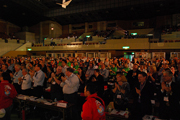Two-thousand trade union leaders call for union rights

Two-thousand trade union leaders call for union rights, jobs and a peaceful future
Delegates at the UNI Global Union World Congress agreed an ambitious plan for the next four years that will focus on increasing union membership and collective bargaining rights all over the world. These unions are calling for a ‘Race to the Top’ in the global labour market.
With the G20 Summit in Seoul last week and the Asia-Pacific Economic Cooperation countries meeting last weekend near Tokyo, it was the perfect time and place to broadcast this message.
“We were in Asia for the first time for a UNI Global Congress, and indeed this week’s G20 met in Asia for the first time too,” said UNI General Secretary Philip Jennings. “This reflects the economic power shift in the world. However, the shift in the balance of the world economy towards Asia requires a strong trade union movement, working to ensure basic labour law protection and adequate social protection.”
With a global labour market that knows no boundaries, to protect the global work force and create a global work place with dignity, all workers around the world, must have the right to join unions and bargain collectively, UNI says.
Joe de Bruyn, the newly elected president of UNI and a leader of Australian union SDA, said that the global meltdown has reinforced the need for reform.
“The present economic and environmental crisis requires deeper and bolder changes in the global economic architecture, including reforms in APEC. A guiding reform principle should be how to put workers and people at the centre of development. This means abandoning the narrow neo-liberal approach which worships on the abstract altar of free trade,” he said.
A new plan for organising and bargaining rights called Breaking Through was adopted at the Congress. Along with the fight for these rights, UNI is pushing world governments to focus on job creation as a way to come out of the global economic crisis. It is also pushing for the abolition of all nuclear weapons, as a safe and just world for workers can only exist when we are free from the fear of nuclear attack.
At the Congress, UNI delegates passed a range of motions, including one that will ensure that all UNI leadership structures are at least 40 percent men and 40 percent women, another that creates an organising fund to funnel donations from UNI unions to organising projects around the world and a motion to support Palestinian and Israeli unions in the creation of a Palestinian state.
Delegates also passed a resolution calling for the abolition of nuclear weapons. Holding the Congress in Nagasaki gave particular emphasis to this motion, as a bomb survivor and children from Nagasaki spoke to the Congress about their work to abolish nuclear weapons.
Along with electing de Bruyn as the new president, delegates reelected Philip Jennings to the post of General Secretary.
The Congress closed on a bright note with Jennings announcing reports of the release of Burmese pro-democracy leader Aung San Suu Kyi.
You can find out more about the Congress events on the Congress blog, which was very active during the Congress period: http://www.uniglobalunion.org/blogs/nagasaki.nsf
We are UNI Global Union on Facebook and @UNIGlobalUnion on Twitter.

